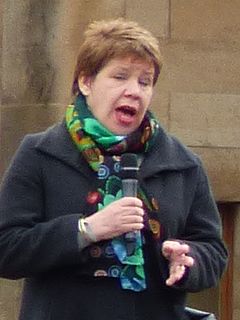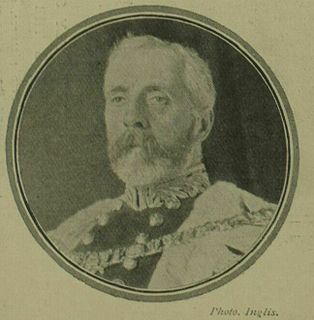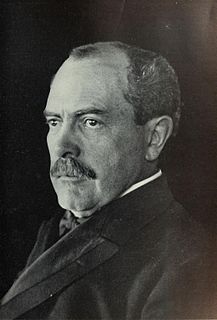Baron Selsdon, of Croydon in the County of Surrey, is a title in the Peerage of the United Kingdom. It was created in 1932 for the Conservative politician Sir William Mitchell-Thomson, 2nd Baronet. His son, the second Baron, was a successful racing driver, winning the 1949 24 Hours of Le Mans in the first Ferrari. As of 2009 the titles are held by the second Baron's only son, the third Baron, who succeeded in 1963. He is one of the ninety elected hereditary peers that remain in the House of Lords after the House of Lords Act of 1999. Lord Selsdon sits on the Conservative benches. The Mitchell-Thomson Baronetcy, of Polmood in the County of Peebles, was created in the Baronetage of the United Kingdom in 1900 for the first Baron's father, Sir Mitchell Mitchell-Thomson, Lord Provost of Edinburgh from 1897 to 1900.

Lesley Hinds is a Scottish Labour Party politician who served as Lord Provost of Edinburgh, Scotland from 2003 to 2007.

Edinburgh Central was a burgh constituency of the House of Commons of the Parliament of the United Kingdom from 1885 to 2005. It elected one Member of Parliament (MP) by the first past the post system of election.
Sir James David Marwick FRSE LLD was a Scottish lawyer, historian and town clerk. He served as Town Clerk of Glasgow for thirty-one years, during which time the entire city was transformed. Its powers and amenities were improved by by-laws and Acts of Parliament, and Marwick directed the city of Glasgow's development for much of the second half of the 19th century.
Not to be confused with George Prévost

Sir James Puckering Gibson, 1st Baronet, was a Scottish Liberal Party politician. He was Lord Provost of Edinburgh 1906-9 and Liberal MP for Edinburgh East from 1909 to 1912.
The 1982 Montreal municipal election took place on November 14, 1982, to elect a mayor and city councillors in Montreal, Quebec, Canada. Longtime mayor Jean Drapeau was re-elected for what turned out to be his final term in office, defeating challenger Jean Doré.
Steve Cardownie is a Scottish National Party (SNP) politician and former Deputy Lord Provost of the City of Edinburgh Council where he was a councillor for the Forth ward.
The Edinburgh East by-election was a Parliamentary by-election. It returned one Member of Parliament to the House of Commons of the United Kingdom, elected by the first past the post voting system.
The 1964 Waltham Forest Council election took place on 7 May 1964 to elect members of Waltham Forest London Borough Council in London, England. The whole council was up for election and the Labour party gained control of the council.
The 1964 Redbridge Council election took place on 7 May 1964 to elect members of Redbridge London Borough Council in London, England. The whole council was up for election and the Conservative party gained control of the council.

An Election to the Edinburgh Corporation was held on 7 May 1968, alongside municipal elections across Scotland. Of the councils 68 seats, 22 were up for election. Despite receiving the most votes of any single party, the SNP won only 7 seats. Unlike in Glasgow, the Progressives and Conservatives did not run on a joint ticket. Despite that however the parties only ran competing candidates in the Gorgie-Dalry ward.

An Election to the Edinburgh Corporation was held on 6 May 1969, alongside municipal elections across Scotland. Of the councils 68 seats, 23 were up for election.

An Election to the Edinburgh Corporation was held on 6 November 1894, alongside municipal elections across Scotland, and the wider British local elections. Elections took place in 5 of the cities 13 wards, with candidates in the remaining 8 being returned unopposed. A candidate, Thomas Blake, had intended to run against incumbent Lord Provost James Russell in St Cuthbert's Ward; however, due to a mistake at the nomination, Blake could not be accepted as a candidate.
An Election to Leith Burgh Council was held on 6 November 1894, alongside municipal elections across Scotland, and the wider British local elections. Contests took place in 3 of the burghs 6 wards, with candidates in the remaining 3 being returned unopposed.
An Election to the Edinburgh Corporation was held on 5 November 1895, alongside municipal elections across Scotland, and the wider British local elections. Contests took place in 2 of the cities 13 wards, with candidates in the remaining 11 being returned unopposed. The election was relatively quiet, with no particularly important issues being raised.

Elections to the Corporation of the City of Glasgow were held on Tuesday 3 November 1896, alongside municipal elections across Scotland, and the wider British local elections.
Election for Edinburgh Corporation were held on Tuesday 3 November 1896, alongside municipal elections across Scotland, and the wider British local elections. The election was relatively quiet, with no particularly important issues being raised, and contests took place in only 2 of the cities 13 wards, with candidates in the remaining 11 being returned unopposed.

In the Chicago mayoral election of 1905 Democrat Edward F. Dunne defeated Republican John Maynard Harlan and Socialist John Collins.








